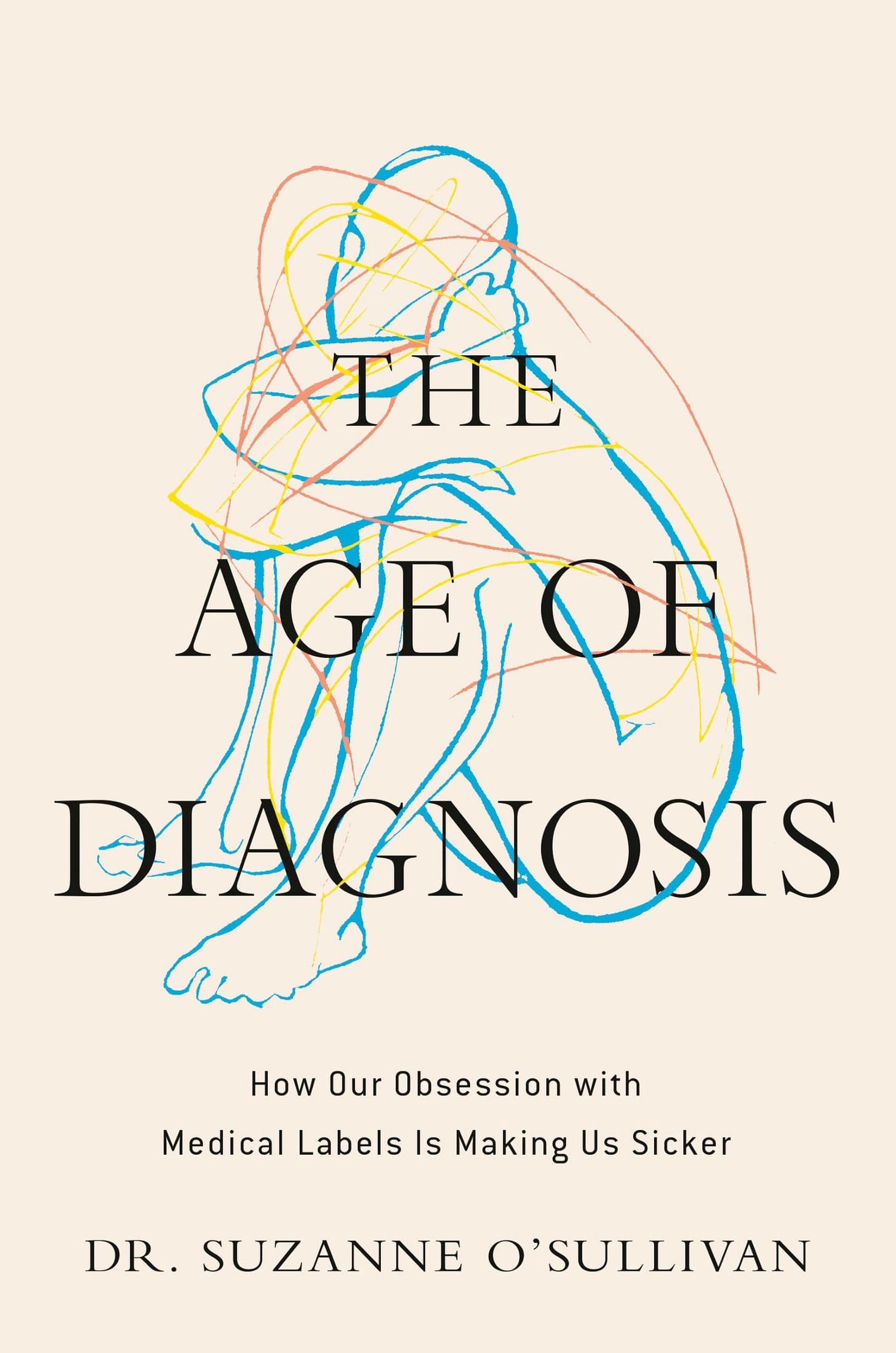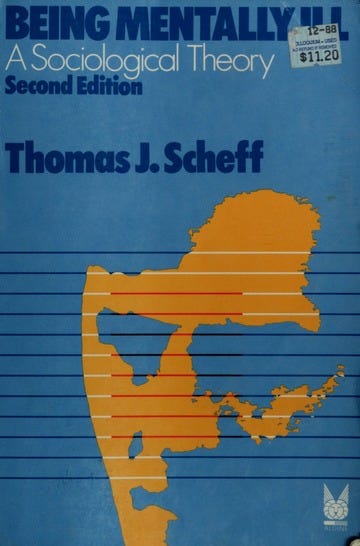The Age of Overdiagnosis Panic
psychogenics vs psychopolitics in the MAHA era
I spent last week in the suburbs of LA visiting my partner’s great aunt, who was recently diagnosed with leukemia and given two months to live, but has, somewhat miraculously, gone into complete remission after a round of treatment.
Controversial opinion, but medicine is pretty cool! And also should be free!!!
Anyway, I packed two books but didn’t end up cracking either of them open; instead I got distracted reading this article by the journalist and ME/CFS advocate David Tuller on a book called The Age of Diagnosis, and then I spent the rest of the week reading it through my perpetually rolled eyes.
Dr. Suzanne O’Sullivan is an Irish neurologist who specializes in epilepsy, and she’s put out a few books so far that follow the case-study-compilation format typical of many doctor-authors. She is fascinated by psychosomatic illness and conversion disorder (now officially called Functional Neurological Disorder) and specifically, she’s an expert in psychogenic seizures — real seizures that show normal electrical activity on brain scans.
I agree that the complex interplay between mind and body is fascinating, that we don’t totally understand it, and that the mind sometimes influences the body’s responses. But O’Sullivan’s new book takes that idea and applies it to like, every diagnostic label that she considers trendy and does not fully understand, including: autism, ADHD, Long Covid, and POTS.
She believes that diagnoses are supposed to help people get better, and she defines overdiagnosis not as incorrect diagnosis, but diagnosis that doesn’t benefit a person.
It’s complicated, though, because research shows that diagnoses of all kinds have both positive and negative consequences, many of which have more to do with the structures of our society than the personal stuff O’Sullivan mostly focuses on, like self-worth and achievement.
O’Sullivan is concerned that diagnostic labels themselves are harming people, and it’s not that we are ‘getting sicker,’ but that we are ‘attributing more to sickness’:
“We are becoming victims of too much medicine and it is time to turn back the dial.”
To be fair, O’Sullivan does say that psychosomatic illnesses are not malingering — people aren’t faking them — and that they are real and disabling. But she also argues that diagnostic labels themselves have the power to make us literally sick, and that we are subconsciously using them to paper over our perceived failures in life.
Psychologizing, Biologizing, and Labelling
The Age of Diagnosis is a house built on social labelling theory, which was popular with sociologists in the 60’s, and appears to be making a comeback lately.
It started with the question of crime — labelling theorists proposed that deviant behavior was caused by people in power labelling certain behaviors and those who engaged in them ‘criminal’, which the person so-labelled accepted about themselves, which then caused them to do more crime.
It’s a micro-level lens that doesn’t consider structures like poverty and racism that also shape crime. But, with the 1966 book Being Mentally Ill by Thomas J. Scheff, labelling theory got expanded to medicine. Scheff thought diagnosis could initiate a person into ‘the sick role’,1 and that they would manifest the symptoms of their diagnosis unconsciously to please their doctors.
“It can be argued,” Scheff wrote, “that when a person is in a confused and suggestible state, when he organizes his feelings and behavior by using the sick role and when his choice of roles is validated by a physician or others, he is ‘hooked’ and will proceed on a career of chronic illness."2
O'Sullivan, by her own admission, is 'a psychologiser':
"I am one of a group of doctors who prefer to ask the question, 'What has happened to you?' instead of, 'What is wrong with you?'"
She contrasts this with 'biologizers', who view everything as having a physical basis. Neither is wrong, she says, just different approaches to medicine:
"As a 'psychologiser', I hope that helping people to understand that something in their social environment has made them sick will give them control over how to deal with external stressors in the future. I fear that a view that talks too much about internal biological processes makes people passive victims of their medical disorder which takes away their control."
O'Sullivan takes the 'what happened to you' approach from Lucy Johnstone, a British psychologist who developed the Power Threat Meaning Framework as an alternative to psychiatric diagnosis. I used to think this was a radical alternative to what O'Sullivan calls ‘biologizing’, and that attributing every problem to a biological dysfunction was more useful for capital.
But I've since realized that there's nothing inherently radical about focusing on trauma, either. The 'what happened to you' approach can individualize illness, too — just with therapy and self-help as solutions instead of drugs. O'Sullivan writes:
"..understanding the connection between your history, how you live your life and how you feel is a surer way of responding differently to future adverse life events than any tablet."
It sounds contrarian, but it's really not — she's just saying you need to look inside yourself and figure out how to change your own behavior to get better. Except, under the PTMF, you have no diagnosis, which means you have no claim to illness, which means you have no claim to insurance coverage, welfare benefits, or accommodations.
O’Sullivan argues that we shouldn’t need medical labels to get support, and on the level of ought, I agree with her, but on the level of is — we do need them, and yanking diagnoses away from people right now would effectively cut the poorest people off from the support they need. But I get why this narrative is thriving in the press, because denying people diagnoses saves money.
The Politics of Psychogenic Illness
O’Sullivan doesn’t talk about ME/CFS at all in the book, which is interesting, because her thesis was ripped directly from its history. For a detailed breakdown, this video by Broken Battery is really good:
But, TLDR: cluster outbreaks of the disease began to be recorded in the 1930’s, and it was dubbed myalgic encephalomyelitis3 after a 1955 outbreak among staff at Royal Free Hospital in London.
In the late 80’s, the CDC changed ME to ‘Chronic Fatigue Syndrome’, which many view as trivializing the severity of the disease and muddying the research waters by making the diagnostic criteria more vague. Around this time, researchers tried to link the illness to viral infections like Epstein-Barr,4 but when they couldn’t, they turned to psychogenic explanations instead.
In her paper Thirty Years of Disdain, Mary Dimmock details how the psychogenic view was constructed in both the US and the UK:
“One proponent of this psychogenic view was [National Institute of Health’s] Stephen Strauss, who in a 1988 scientific publication said that patients with this disease had ‘histories of unachievable ambition, poor coping skills, and somatic complaints’”5
In Britain, a group of psychiatrists, chief among them Dr. Simon Wessely, began to argue that ME/CFS was really caused by the fear of activity. Dimmock writes:
“This maladaptive avoidance of activity is said to result in deconditioning, which in turn is said to cause the ongoing debility and symptoms that patients experience. In other words, patients’ beliefs, behaviors, and various social factors are keeping them sick (or as expressed in the theory, “maintaining” or “perpetuating” their illness), while their neuroticism, introversion and childhood inactivity “predisposed” them to the illness to begin with. The treatment recommended by the proponents of this theory is two pronged; cognitive behavioral therapy (CBT) to reverse patients’ presumed “fear of activity” and “false beliefs” that their disease is organic plus graded exercise therapy (GET) to reverse their presumed deconditioning.”
These ideas about ME/CFS turned out to be wildly untrue and extremely damaging. Graded exercise therapy, recommended after the rigged PACE Trial in 2011, has been found to actually make patients worse — Emma Shorter told the Scottish parliament in 2018 that she started GET able to walk four minutes a day, and ended in a wheelchair.
“As I began to get sicker and sicker,” she said, “I was told, this is the moment where you push through and you get better.”
Patients have been fighting against the psychogenic view for decades. So why is it still hanging around, haunting other energy-limiting chronic illness categories?
Well, probably because it’s cheaper for governments and insurance companies to encourage recovery than to care for disability. The PACE trial was partially funded by the UK Department of Work and Pensions, and Tuller has pointed out that several researchers in the trial had also consulted for insurance companies.
One company, Swiss RE, wrote an article based on the trial that gave their employees advice on how to save money when it came to ME/CFS. Number one, Tuller writes, was ‘question the diagnosis.’ Number two was to offer coverage for cheap therapies like CBT and graded exercise.
O’Sullivan insists that her book is not about ‘rationing medicine to make it more cost effective,’ but ‘a search for better medical practices,’ and that may well be her truth. But it doesn’t really matter, because her work will be used to support rationing medicine, whether she believes in that or not.
“Healthcare resources would be better spent on campaigning to help people live healthier lives,” she writes in her conclusion. How very MAHA of her!
Recycling the Story: POTS and Long Covid
As a book, The Age of Diagnosis suffers under the breadth of its scope — in trying to cover a range of complex medical conditions and slot them all into her theory of diagnostic harm, O'Sullivan doesn't do deep enough research, and she ends up making irrelevant and highly misleading arguments.



